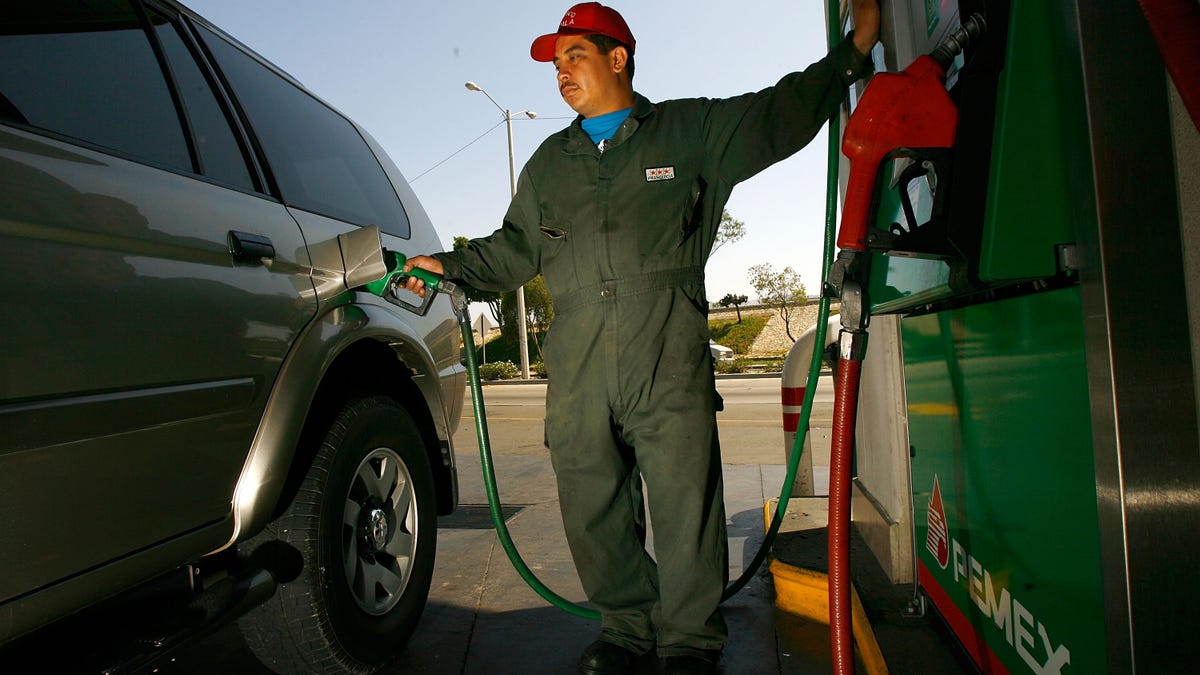
TIJUANA, MEXICO - JUNE 27: A Pemex gas station attendant fills a car registered with a California license plate on June 27, 2008 in Tijuana, Mexico. With the cost of gasoline in California around $4.60 per gallon, many drivers are buying their fuel in Mexico for about $3.20. There is a price to pay for cheaper gas though. Mexican gas is formulated with more sulfur than California gas and that can damage the emission control equipment on US cars, causing them to fail emissions tests and leading to expensive repairs. In addition, unless a driver has other business in Mexico, part of their fuel savings will be burned up idling in a line that can easily last for hours to get back into the US. (Photo by David McNew/Getty Images) (2008 Getty Images)
MEXICO CITY – Mexico’s struggling oil giant Pemex must quickly sell non-key assets and strike international joint ventures to shore up its business and bounce back from a liquidity crisis, experts said.
“They need to start selling non-strategic assets and use that liquidity to finance joint production and exploration projects,” said Actinver stock brokerage analyst Araceli Espinosa.
This is a long-term industry that requires risk and a lot of investment. Right now, oil prices are low, but we don’t know what other changes [geopolitical or market-driven] could come that could affect supply.
Pemex’s new CEO Jose Antonio Gonzalez is seeking buyers and hopes to announce the divestments in the fall, she added. The sales will come just before Pemex pursues a game-changing auction of its deep-water oil fields in December.
Pemex has said transportation, storage facilities and so-called flotels moving personnel between maritime-oil platforms, could be on the block but has not provided more specifics.
Raising cash is pivotal at a time when the state-owned oil producer is facing a cash squeeze from falling oil prices and mounting debt, currently hovering at $86 billion.
- Mexico chemical plant blast kills 13, injures dozens
- Opinion: A successful Mexican energy reform is gateway to improve U.S. security
- Mexico’s Pemex plans to open 5 gas stations in Texas as experiment in U.S. market
- Mexico announces important discovery of oil reserve in Gulf of Mexico
- Tragic oil plant explosion in Mexico leaves dozens dead, missing
- Mexico Pemex Explosion Kills at Least 25
This week, Mexico City injected $4.2 billion into the state-owned firm to help it face near-term debt payments and finance its operations amid mounting losses that have credit downgrades. Production has plunged to 2.2 million barrels a day from a high of 3.3 million barrels 12 years ago.
Espinosa said slumping crude prices, which have depressed Mexican barrels to fetch just over $30, are making joint venture deals or “farmouts” between Pemex and international peers, which the 2013 sweeping energy reform was designed to encourage, more costly to pursue.
For this reason, a slew of potentially lucrative shallow-water projects have found no takers. However, Mexico is working to boost their attractiveness as part of so-called Round One auctions to open the energy sector and scheduled to take place in the near-to-medium term.
December’s tender is expected to lure over $6 billion and attract the likes of Royal Dutch Shell and BP, Espinosa said. Three shallow-water auctions have already taken place under Round One but have failed to meet government revenue targets due to low oil prices.
December’s auction is expected to hive off 10 potentially lucrative exploration blocks in the Gulf of Mexico. To boost their attractiveness, cash-strapped oil firms will be allowed to delay drilling until four years after the contracts are awarded, to buy time until crude prices recover.
Espinosa said wooing bidders could be challenging as deep-water drilling will be unprofitable until oil prices reach $70 a barrel.
“At $30, shallow-water exploration is feasible, but not deep-water,” she noted.
But Guillermo Pineda, an energy consultant at PWC, said most of the 16 firms expected to participate in the sale will likely table an offer.
“This is a long-term industry that requires risk and a lot of investment,” he said. “Right now, oil prices are low, but we don’t know what other changes [geopolitical or market-driven] could come that could affect supply.”
“The Gulf of Mexico is very attractive and has very good fields. It has attracted many international companies and Pemex has a lot of experience operating there,” Pineda added.
The international players will offer Pemex deep-water exploration know-how and cash, a win-win combination that should make the joint ventures profitable in the future, boosting its cash flow.
Pineda said bidders have paid big fees to participate in the auction and receive access to the “data room” including project viability and seismic metrics.
